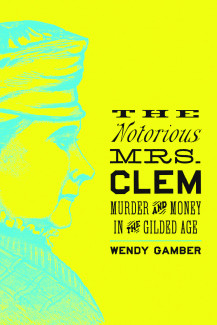
Johns Hopkins UniversityEst. 1876
America’s First Research University
You're a mean one, Mrs. Clem

Well maybe not mean, but cold?
“She was a cold one.” So responded a librarian when I told him I was writing a book about Nancy Clem. The attorneys who prosecuted her, who included future U.S. president Benjamin Harrison, would have agreed. They portrayed Clem—the supposed originator of a nineteenth-century Ponzi scheme—as a calculating woman, one who possessed “more than ordinary executive ability.” She was, therefore, utterly capable of orchestrating the 1868 killing of her business partner, Jacob Young, and his wife, Nancy Jane. A woman who could “twirl men around her fingers like ribbons,” she allegedly had enlisted her younger brother and a second accomplice in an elaborate conspiracy that culminated in murder. Harrison claimed that Clem “laughed hypocritically as she lured her victims to their doom.” She was a cold one, all right.
Or was she? Clem’s attorneys faced a formidable challenge—in part because much of the considerably damning, albeit almost entirely circumstantial, evidence suggested that the supposedly cold, calculating perpetrator and her suspected accomplices had not quite thought things through. Whoever purchased the shotgun that killed Jacob Young selected a weapon with uniquely identifiable features, including a broken thimble. Whoever pulled the trigger panicked and left that very same gun behind at the scene of the crime. A woman wearing new shoes—in the same size Clem wore—pressed clear and distinct footprints into the crime scene’s “yielding soil;” Clem’s domestic servant would testify that her employer had purchased a pair of gaiters a few days before the murder and discarded them shortly thereafter. Surely a cold one could have done better.
Nevertheless the defense had an advantage: the defendant herself. Then, as now, class and “character” shaped perceptions of criminality. Clem was a respectable middle-class woman—not the sort of person nineteenth-century Americans envisioned when they imagined a murderess. She was a loving wife and devoted mother. Such a woman, defense attorneys argued, was inherently incapable of murder. Clem, they maintained, was no calculating executive, but one who used her modest profits to enhance her family’s comfort. And here was the question on which much of the trial rhetoric focused: should women, especially married women, engage in business? If prosecutors saw Clem’s managerial ability as evidence of guilt, defense attorneys considered her business acumen evidence of good character, the hallmark of a faithful (and innocent) wife.
It would take five years and as many trials to resolve Clem’s fate. Many of the issues over which prosecution and defense argued were never settled—not least the question of what women’s relationship to the marketplace should be. No one ever solved the riddle of Nancy Clem. She was a mystery to the many people who crowded successive courtrooms and the many more who read about her in the nation’s newspapers. She remains a mystery today. That’s precisely why she is so fascinating. Was Clem a criminal mastermind who carefully planned premeditated murder, a hapless confidence woman who killed to escape financial ruin, an innocent woman wrongly accused of a terrible crime? Was she a cold one? We’ll probably never know.
Wendy Gamber is Robert F. Byrnes Professor in History at Indiana University, Bloomington. She is the author of The Boardinghouse in Nineteenth-Century America, also published by Johns Hopkins, and The Female Economy: The Millinery and Dressmaking Trades, 1860-1930. Her newest book, The Notorious Mrs. Clem: Murder and Money in the Gilded Age, is available now.


